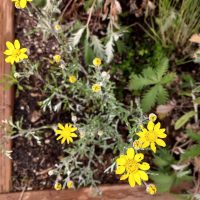Viburnum: A Starring Role in Science

The next time you treat yourself to a walk through the inviting grounds of UW Botanic Gardens, take a moment to appreciate that the flowers and trees play an important role in scientific research–with implications for plants and research institutions all over the world.
“We get requests for plant materials from researchers and institutions about 10 times a year,” reports Raymond J.
Native Plant Appreciation Month – Supporting Beneficial Insects

Though we appreciate native plants every day, Washington State designates April as Native Plant Appreciation Month. This year’s theme, “Native Pollinators Need Native Plants,” is a mantra to live and garden by. Pollination is just one of many ecosystem services provided by native insects, and while there are many resources published about gardening for pollinators and building pollinator pathways, we should also take a moment to look holistically at supporting all beneficial insects in our garden, for pollination and beyond.
Read more“Magnificent Magnolias!”

If you missed our peak magnolia bloom, you can extend their beauty virtually here enjoying several wonderful photos of a few of my personal favorites. Many thanks to both Niall Dunne – Arboretum Foundation Communications Manager and Bulletin editor, Ray Larson – UW Botanic Gardens Interim Director and Skylar Lin – PSGO aerial photographer for sharing their extraordinary photos capturing these magnificent magnolias in bloom!
Read moreUnraveling the Mysteries of Seeds

Sometimes it takes a while to unravel the mystery of seeds; other times they present no mystery at all. Take showy stickseed (Hackelia venusta) seeds as an example of the former. The germination ecology of showy stickseed was for years a mystery. Traditional propagation techniques using cold stratification yielded poor germination rates. Researchers experimented with various scarification techniques (altering the seed coat by weakening or creating an opening) and gibberellic acid, a plant growth hormone, to stimulate germination.
Read moreConserving plants by investing in people

It’s an early winter morning at the Center for Urban Horticulture greenhouse. While the sun considers rising, Sarah Shank greets her seedlings. Fueled by a passion for growing plants and her first cup of coffee, she describes her quiet mornings watering rare native plants as the perfect way to begin her workday. The current plants she tends to, Astragalus sinuatus (Whited’s milk-vetch) and Eriogonum codium (Umtanum buckwheat), she grew from seed and each day begins with observing them.
Read moreApril 2021 Plant Profile: Metasequoia glyptostroboides, aka Hobbit trees

The mysterious case of X-478*A and B, a.k.a. “Hobbit trees”, continue to baffle and impress those who are familiar with these two unique Arboretum Dawn Redwoods.
Read more“Firs Things Firs”

1) Abies bornmuelleriana Turkish Fir
This species is allied to the Caucasian Fir (A. Nordmanniana), but with some characteristics of the Greek Fir (A. cephalonica), notably the resinous buds and glabrous shoots.
It has a small range in northwestern Asia Minor, where it forms forests on the Bithynian Olympus.
With regards to our collections at the Arboretum, we have a few specimens in the Northwest Pinetum, as well as the one shown here residing below the Pacific Connections New Zealand Garden.
Coppicing: The Endless Gift of Trees

A millennia-old arboricultural practice is alive and well at the SER-UW Native Plant Nursery: Coppicing.
Humans have coppiced trees for 10,000 years, estimates esteemed arborist and author William Logan Bryant. His recent book, Sprout Lands: Tending the Endless Gift of Trees, details this traditional practice with passion and reverence.
In the pre-Industrial era all over the globe, coppicing was the cutting back of a tree or shrub close to ground level in order to obtain a crucial, life-giving harvest: stems, canes and branches to be used for firewood, to build fences, furniture and bridges, and to produce baskets and rope, among many other essentials.
Signs of Spring at the Washington Park Arboretum

1) Leucothoe davisiae Sierra Laurel
This evergreen member of the Heath family is native to the mountains of eastern and northern California where it grows in bogs and seeps.
The hot-pink buds will open in spring to reveal white urn-shaped flowers.
You can find Leucothoe davisiae in the Cascadia Forest.
2) Magnolia sargentiana var.
March 2021 Plant Profile: The Gaultherias of Pacific Connections

The Pacific Connections Gardens is a great place to admire examples of related plants from different parts of the globe. One excellent example of this is the genus Gaultheria. Only a few steps separate Gaultheria species hailing from Chile, China, and the Pacific Northwest!
The genus Gaultheria includes over one hundred and fifty species hailing from North and South America, Eastern and Southeastern Asia, New Guinea, Australia, and New Zealand.